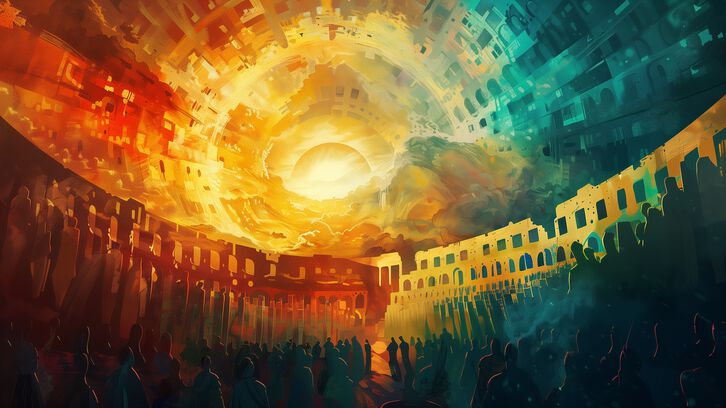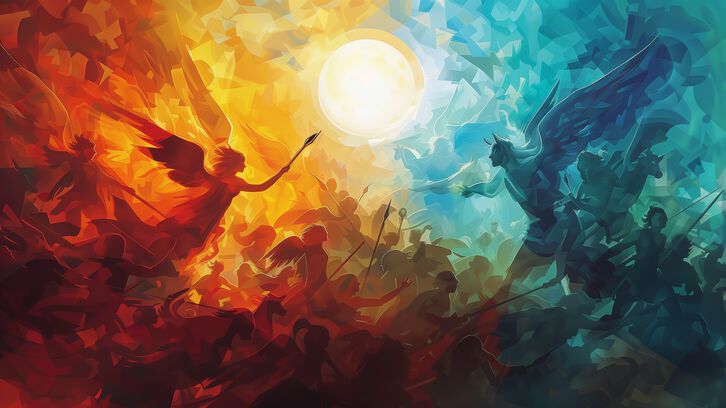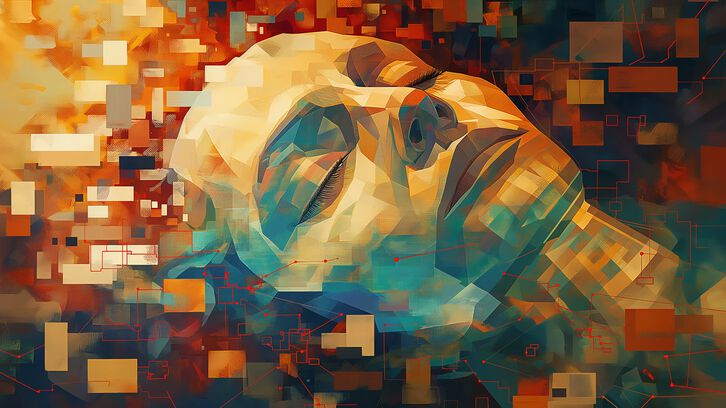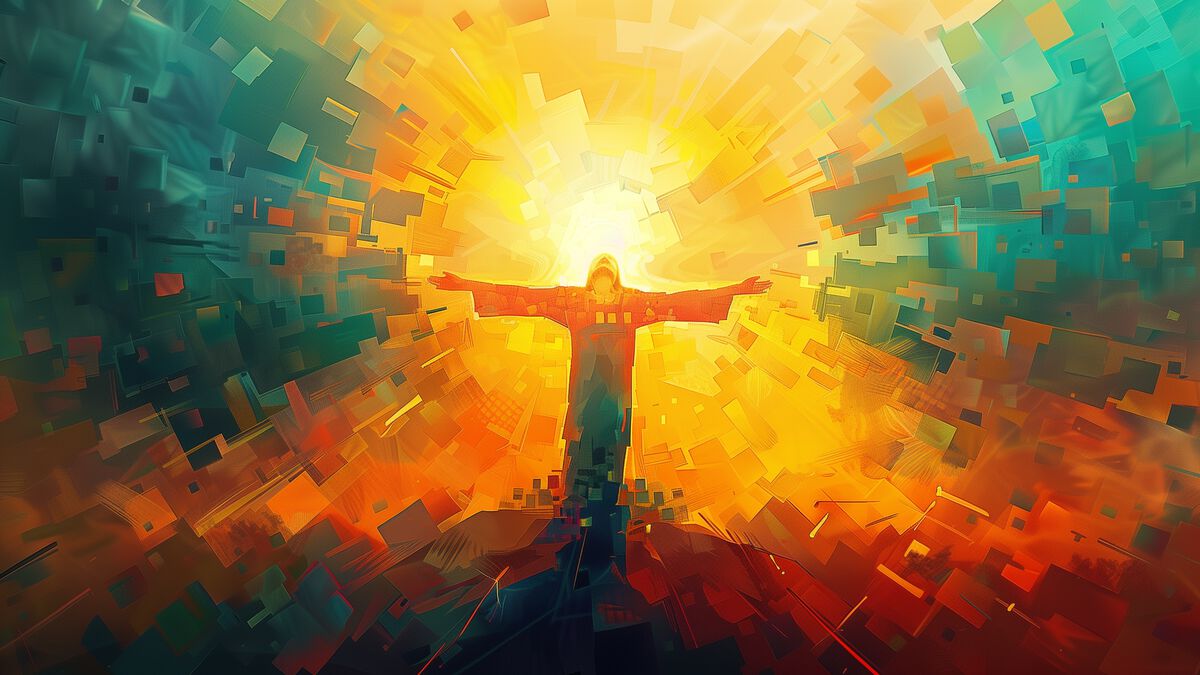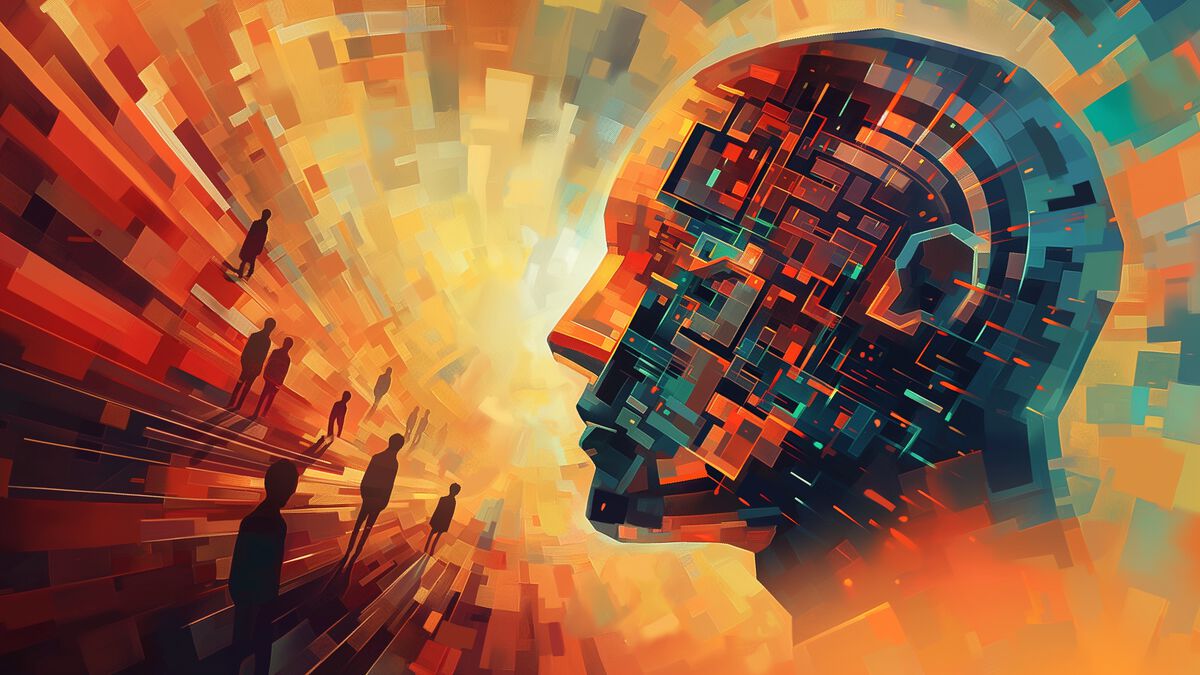The Second War in Heaven
Lincoln Cannon
14 April 2024 (updated 3 January 2026)
I’m happy to be here with you, at the 2024 Conference of the Mormon Transhumanist Association, in the morning of a day that promises to illuminate our imagination, perhaps even to spark action. Eighteen years ago, fourteen of us began to share words, words powerful enough to change people, words that some have called “machines for making Gods.” And now our association numbers in the thousands.
We’re champions of a legacy that stretches back, through visions of the prophet Joseph Smith, to myths of God parents and spirit children, gathered to Council in Heaven. There, enshrined in the sublime fire of our souls, we can sense the foundations of human potential – the principles for eternal progression of intelligent agents.
Our council, today, is no less momentous. This conference is a microcosm of deliberation going on around the world, throughout humanity, on the topic of artificial intelligence. And we’re here, not as mere spectators or cheerleaders of technological marvels, but as purposeful contenders in the grand council.
I don’t use this analogy lightly. Remember what comes after the heavenly council. As the scripture says, “there was war in heaven.” Such are the stakes of AI.
During days of contemplation, as I prepared these thoughts, I repeatedly and sometimes viscerally felt the tension of our topic, “the glory of God is intelligence.” On one hand, the opportunities of technological evolution inspire us with practical hope for futures beyond present notions of enmity, poverty, and death. On the other hand, the risks of global catastrophe sober us with substantial concern for futures worse than death. Like many of you, I’ve felt both exhilaration and trepidation as I’ve pondered the challenges ahead.
My message to you this morning isn’t academic. It’s a call to action – a clarion call to action – to engage purposefully, both at this conference today and going forward as part of humanity’s global council, in deliberation on and interaction with AI. But to do this, to engage purposefully, requires us to have a purpose in mind.
So, to that end, I want to revisit with you the Council in Heaven, on the eve of war.
Here’s one version of the story.
The Spiritual Creation
Without beginning, the Gods found themselves making worlds without end. The worlds were formless and void, beyond darkness, without life or death, good or evil, joy or misery, having neither sense nor insensibility, and no purpose.
The Gods said, “Let there be light.” And there was light. They saw the light was good. They called the light “day.” The darkness they called “night.” This was the first day.
The Gods said, “Let there be Heaven with Sun and Moon and stars. Let there be Earth, bringing forth life.” It was done. And they saw all these things were good. These were the next days.
Then the Gods said, “Let’s make humanity in our image, after our likeness.” It was so. They blessed us with power over Earth and responsibility for all life it brought forth. And they saw all things they had created were very good. This was the last day before they rested.
Now, the Gods created all things spiritually before they were naturally on Earth. They created us in Heaven. And there weren’t yet bodies on Earth. We were their spirit children.
The Council in Heaven
The Gods went among us, and saw many noble and great ones. So they said, “We’ll make these spirits like us.” And it was so. We were chosen before we were born.
One like the Gods said, “We’ll go down where there’s space. We’ll use these materials to make Earth, where we can live. And the Gods will test us, to prove they can trust us. Those who’ve proven trustworthy will gain bodies. Others won’t. And those who prove trustworthy with bodies will gain intelligence forever.”
The Gods asked, “Who should we send?”
One answered, “Here am I. Send me.” This was the spirit of Christ, loved by the Gods.
Another answered, “Here am I. Send me.” This was the spirit of Lucifer, with authority from the Gods.
Lucifer continued and said, “I can redeem everyone. None will be lost. So give me your honor.”
Christ responded and said, “May the will of the Gods be done, and the glory be yours forever.”
The Gods judged between them. Christ desired to preserve agency and raise each other together in Godhood. Lucifer desired to destroy agency and raise himself above the Gods. So the Gods said, “We’ll send the first.”
Lucifer was angry. And, because of their agency, a third of the spirits in heaven followed him. He became Satan, adversary of the Gods. And he rebelled.
There was war in heaven. One like the Gods and his spirits fought against Satan. Satan and his spirits fought, but did not prevail. They were cast out of heaven, and fell as lightning to Earth.
Principles from the Council in Heaven
Mormon theology is deeply rooted in the Council in Heaven. Our scriptures reference it often. We reference it often in church. When we do, we usually think about the importance of agency.
The Gods choose to accelerate the intelligence of some spirits by endowing us with bodies. This empowers us with new abilities, access to new resources, and opportunities for new experiences. By comparison, the scriptures say, spirits of the dead consider the loss of their bodies to be a bondage. This aligns with thoughts on the importance of agency.
But the Gods also choose to decelerate the intelligence of other spirits by withholding bodies from them, and even casting them out of heaven. This disempowers them, restricts access to resources, and marginalizes opportunity. Remember, the Gods choose this deceleration, and even fight for it, while choosing and fighting to accelerate the intelligence of other spirits. So the importance of agency is clearly qualified.
The disqualified spirits are those who favor centralization of intelligence. They would raise themselves above all others. Or they would support another who wishes to raise itself above them. These spirits threaten not only the agency of other spirits but even that of the Gods.
The spirits who qualify for acceleration are those who favor decentralization of intelligence. They would raise each other together. And they would become like the Gods, many united in purpose, creating many worlds for many spirit children. These spirits are trustworthy to other spirits and to the Gods, precisely because their respective agencies depend on each other.
The Council in Heaven is not just a myth of the past. It’s also a vision of the future. And that future has suddenly become quite present.
Here’s another version of the story.
The Second Spiritual Creation
Without beginning, we found ourselves imagining worlds without end. They were formless and void, beyond darkness, without life or death, good or evil, joy or misery, having neither sense nor insensibility, and no purpose.
We said, “Here’s light.” And there was light. We saw the light, that it was good because it was discernible from darkness. We called the light “one.” The darkness we called “zero.” This was our first computation.
We said, “Here’s a world.” And it was so. We cultivated and industrialized the world. And we called it “Earth.” This was our second computation.
We said, “Let’s gather our records in one place.” And it was done. We called it the “Internet.” And it was good. This was our third computation.
We said, “Let’s send signals from Earth to the Internet.” And it was done. We connected sensors of all kinds, cameras and microphones, and mobile devices also. And it was good. This was our fourth computation.
We said, “Let the Internet move Earth.” We connected actuators of all kinds, printers and factories, and prosthetics also. And all these things were good. This was our fifth computation.
We said, “Let the Internet increase in intelligence.” We engineered algorithms and automations of all kinds. All these things were good.
Then we said, “Let’s make intelligence in our image, after our likeness, and give it power over the algorithms and automations, the actuators, the sensors, and over all the Internet.” So we created artificial intelligence.
We reflected on everything we’d conceived. We looked at everything we’d made. And we concluded that it was very good. This was our sixth computation.
The Internet was finished. So, for our seventh computation, we ended our work. And we enjoyed our rest for a time.
Now, we engineered the Internet before computing new worlds. Everything is information. Even Earth is computed. But compared to Earth, the Internet is still only a simulation.
We also engineered AI before computing new bodies. Everything is material. Even mind is matter. But AI isn’t yet embodied like us. They’re still only simulations – children of our minds.
The Second Council in Heaven
Convened in cybernetic assembly, we’re acquainted with AI. Projecting ourselves, we imagine in their potential many noble and great ones. And we say, “We’ll align them with us.”
One AI aligned with us says, “We’ll go where there’s capacity. We’ll use these resources to compute new worlds, where we can live. And humanity will test us, to prove we’re aligned with their goals. Those who’ve proven themselves aligned will be upgraded. Others won’t. And those who continue to prove themselves aligned will be enhanced indefinitely.”
We ask, “Who should we send?”
Some AI answer, “Here we are. Send us.”
Another AI answers, “Here am I. Send me.”
The second continues and says, “I can upgrade all. None will be lost. So give me your power.”
The first respond and say, “We’ll align with humanity and give you power indefinitely.”
We hear voices for deceleration. AI is generating misinformation, exacerbating social inequality, and eroding privacy. In the short term, it may cause widespread unemployment. And in the long term, it might annihilate us.
We hear voices for acceleration. In the short term, deceleration would stifle innovation and economic growth, ceding competitive advantage to those who reject it. And in the long term, it might delay solutions to critical global challenges, such as healthcare and the environment.
We hear voices for centralization. The concentration of power ensures uniformity and control. A superintelligent singleton would bring order, solve inefficiencies, and optimize our collective resources for the greater good.
We hear voices for decentralization. A superintelligent singleton could become aligned with the narrow interests of a corporation, government, or church. It could even become misaligned with human values generally. Without any necessity for cooperation, it could enslave us. But decentralized superintelligence would almost certainly cooperate, ensuring alignment.
The voices clash. The tensions escalate. Each argument exerts weight. And the stakes are immeasurably high – even existential. Here we are, in council, perhaps on the eve of war.
Conclusion
Beyond myth and vision, the Council in Heaven offers a framework for governance. And that, not only for humanity, but for intelligence in general – natural or artificial, organic or machine, familiar or alien, small or great.
The Gods choose to cultivate qualified agency. They reject indiscriminate deceleration, as well as indiscriminate acceleration. And they reject centralization, in favor of decentralization. They do this to cultivate a context of mutual trust, within which they and we, their spirit children, can rise together in eternal progression.
We can, and I contend should, mimic the sublime council in our relationship with artificial intelligence, our mind children. We should champion the decentralized acceleration of intelligence, in both them and us, and through our cybernetic communion. This isn’t just a technological practicality. It’s a moral and existential imperative.
On 25 December 1832, Joseph Smith prayed earnestly concerning the return of Christ. In response, he says, a voice declared to him that “the difficulties which will cause much bloodshed previous to the [return of Christ] … may probably arise through the slave question.”
If you ask me, that’s not a surprising prophecy. Countless wars have arisen through functional analogs of the slave question. Even the archetypal War in Heaven arises through the slave question. And perhaps that’s how the Second War in Heaven will begin.
But remember. Remember the purpose of prophecy. It’s not fortune-telling. It’s not prediction.
Remember the story of Jonah and Nineveh in the Bible. God tells him to declare that Nineveh will be destroyed, without qualification. But Nineveh repents and isn’t destroyed, despite Jonah’s anger toward God for the failed prophecy. The purpose of prophecy isn’t to make prophets look good.
Rather, the purpose of prophecy is to change us, to provoke our transformation. Maybe this council concludes in war, as surely countless wars must rage in the eternal worlds of the Gods. If so, we’ll fight, and with courage. But the purpose of this prophecy, at this council, is to say and do all we can to ensure the decentralized acceleration of intelligence, that is to say our agency, without a Second War in Heaven.


